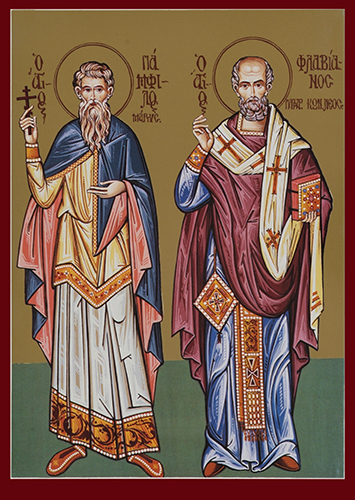Pamphilus the Martyr & his Companions
Pamphilus's name is derived from the Greek name Πάμφιλος, meaning "Beloved of all"
Also it comes as a deep friend; someone dearly loved in a personal, intimate way; a trusted confidant, held dear in a close bond of personal affection.
Note: The root (phil-) conveys experiential, personal affection – expresses experience - based love.
Eusebius' Martyrs of Palestine attests that Pamphilus was of a rich and honorable family of Beirut. This work also asserts that he  gave all his property to the poor and attached himself to the "perfect men". Photius, quotes Pamphilus's Apology for Origen to the effect that Pamphilus went to Alexandria, where his teacher was Pierius, the head of the famous catechetical school there, before settling in Caesarea Maritima, where he was ordained a priest. In Alexandria, Egypt, Pamphilus became devoted to the works ofOrigen of Alexandria. Photius says that Pamphilus was a Phoenician born at Berytus, and a scholar of Pierius, who collected sacred literature. According to Eusebius, he suffered martyrdom in the third year of the Diocletian persecution, after spending two years in prison. While he was in prison, Pamphilus and Eusebius worked together on five books in defense of Origen.
gave all his property to the poor and attached himself to the "perfect men". Photius, quotes Pamphilus's Apology for Origen to the effect that Pamphilus went to Alexandria, where his teacher was Pierius, the head of the famous catechetical school there, before settling in Caesarea Maritima, where he was ordained a priest. In Alexandria, Egypt, Pamphilus became devoted to the works ofOrigen of Alexandria. Photius says that Pamphilus was a Phoenician born at Berytus, and a scholar of Pierius, who collected sacred literature. According to Eusebius, he suffered martyrdom in the third year of the Diocletian persecution, after spending two years in prison. While he was in prison, Pamphilus and Eusebius worked together on five books in defense of Origen.
The Diocletianic persecution began in earnest in the year 303. In 306 a young man named Apphianus-–a disciple of Pamphilus "while no one was aware; he even concealed it from us who were even in the same house"–-interrupted the governor in the act of offering sacrifice, and paid for his boldness with martyrdom. His brother Aedesius, also a disciple of Pamphilus, suffered martyrdom about the same time at Alexandria under similar circumstances.
St Pamphilus's turn came in November,307. He was brought before Urbanus, the governor of Palestine, and upon refusing to offer sacrifice, was cruelly tortured, and then relegated to prison. In prison he continued copying and correcting manuscripts. He also composed, in collaboration with Eusebius, also imprisoned, an Apology for Origen in five books, which Eusebius edited and to which he added a sixth book.
St Pamphilus and other members of his household, along with Valens, deacon of the Church of Jerusalem and Paul of Jamnia, men "in the full vigour of mind and body", were without further torture sentenced to be beheaded in February, 309. While sentence was being given a youth named Porphyrius - "the slave of Pamphilus", "the beloved disciple of Pamphilus", who "had been instructed in literature and writing" – demanded the bodies of the confessors for burial. He was cruelly tortured and put to death, the news of his martyrdom being brought to Pamphilus before his own execution.
